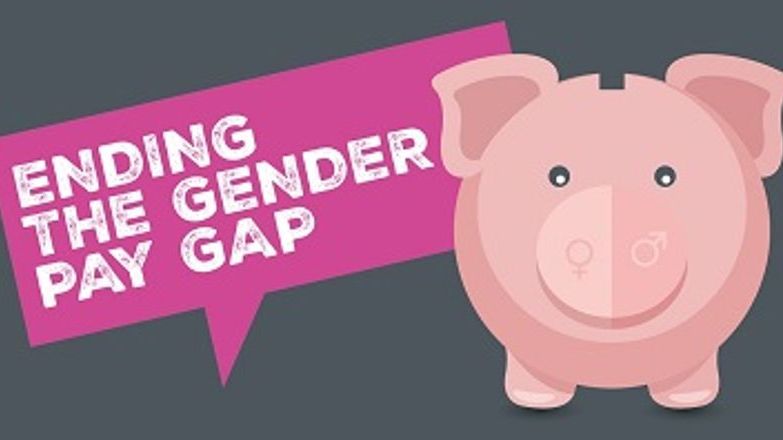Men and women should receive equal pay if they do the same work – or different types of work which can be considered equivalent – unless the employer can justify any difference.
What is Equal Pay?
The equal pay provisions apply to all contractual terms, not just pay. The Equality and Human Rights Commission (EHRC) provides a checklist of what this includes:
- basic pay
- non-discretionary bonuses
- overtime rates and allowances
- performance-related benefits
- severance and redundancy pay
- access to pension schemes
- benefits under pension schemes
- hours of work
- company cars
- sick pay
- fringe benefits such as travel allowances
- benefits in kind
It doesn't matter how long you've been employed, or whether your contract is full-time, part-time, fixed-term, zero hours or casual. You are covered regardless of whether you are an employee, a worker, an apprentice, an agency worker or are self-employed and have been hired to do the work personally.
Men and women have the same rights to equal pay, but most claims are brought by women.
Equal Work
The legislation is set out in the Equality Act 2010. It provides that men and women in the same employment doing 'equal work' must be given equal pay. 'Equal work' can be of three types:
- 'like work' is the same or broadly similar work. It involves similar tasks which need similar knowledge and skills to carry out. Any differences in the work are not of practical importance.
- work rated as 'equivalent' has been graded under a valid job evaluation scheme as being of equal value in terms of how demanding it is.
- work of 'equal value' is not similar, and has not been rated as equivalent under a valid job evaluation scheme. It is, though, of equal value in terms of demands such as effort, skill and decision-making. Jobs may therefore appear to involve very different roles, yet still be classed as being of equal value.
When are pay differences allowed?
If one person is paid less than another, the reason must have nothing to do with their sex. But there may be situations which allow for differences in pay and other terms and conditions. To defend an equal pay claim, an employer must show that the pay difference is caused by a 'genuine material factor unrelated to sex' (Law at Work 2020, p272). This reason must be 'significant' and 'the real reason for the difference'. It must not involve direct or indirect sex discrimination.
ACAS gives examples of when it might be legitimate for an employer to pay someone more than someone of the opposite sex who does similar work:
- if they are better qualified, or if they possess crucial skills which make them hard to recruit
- if they are located in an area where the cost of living is higher
- if they work night shifts, and the employer can prove they can attract workers to cover night shifts only by paying more
However, an employer who argues that a pay difference is justified by factors such as superior 'merit' must demonstrate exactly what they mean by that, how they assess such terms, and how they apply those terms to a particular case.
A case in point is that of Samira Ahmed, who brought a claim against the BBC in 2020 with support from the NUJ. Ms Ahmed presented the BBC's 'Newswatch' programme and was paid around one sixth of the rate of her chosen comparator – the 'Points of View' presenter, Jeremy Vine.
An employment tribunal panel found that the work of the two presenters was 'like work', making clear that any differences between the two programmes were minor and had no impact on the work the two presenters did, or the skills and experience required to present the programmes. The BBC failed to demonstrate that the pay inequality was due to material differences between the presenters' roles, programmes and profiles.
The NUJ's general-secretary, Michelle Stanistreet, dismissed the BBC's arguments: 'For the NUJ, this was simply a case of two roles that were commensurate, on two programmes that were supremely comparable, carried out by two high profile experienced presenters.'

Resounding NUJ victory in landmark equal pay case
This outcome should also be a wake-up call for all employers.
As the merits of each case depend so much on individual circumstances, you will need advice from an NUJ national officer if you believe you have a legitimate claim. A useful first step is to check the EHRC's statutory code of practice on equal pay:
Need for a 'comparator'
If you believe you have a valid claim under equal pay legislation, you will ordinarily need a 'comparator' with whom to compare your work. This is someone of the opposite sex in the same employment. They are usually based at the same physical workplace. Law at Work 2020 (p270) advises choosing a comparator whose circumstances are most like your own. This limits an employer's opportunity to argue that any difference in pay is caused by factors other than sex.
If there is no actual person to act as a comparator, it might be possible to base a claim on a hypothetical comparator. The Worksmart job app, backed by the TUC, says:
'An example of direct sex discrimination on pay would be an employer who tells a female employee she would get paid more if she were a man, but there are no men employed by her employer.'
Getting evidence
If you suspect you are being paid unequally, you can question your employer about their pay policies and how they pay people of the opposite sex. ACAS has issued a booklet of guidance, 'Asking and responding to questions of discrimination in the workplace', which may help you assess whether you have a legitimate claim. The booklet has what it calls a 'questioner's template' to guide you in choosing the most effective questions:
Acas suggests your questions could include how the employer determines pay, and whether the comparator's job description includes anything that could explain the difference in pay.
Equal pay and indirect discrimination
An employer's reason for paying someone more may amount to indirect discrimination. This can happen when a particular policy looks as if it affects everyone equally, because it applies to all workers, but in fact leaves some of them worse off.
Law at Work (p273) gives the example of pay rates based on length of service. These may discriminate against women who have taken time off for childcare. Bonus payments for night shifts, to reward workers for the anti-social hours involved, may also discriminate against women who are prevented from working these hours by caring responsibilities.
If an employer has a pay policy that treats part-time workers less favourably than comparable full-time workers, it is likely to amount to indirect sex discrimination because the majority of part-time workers are women.
Indirect discrimination is lawful if employers can prove that the practice is a 'proportionate means of achieving a legitimate aim'. See section on indirect discrimination:
Time limits
You can lodge a claim for equal pay in the employment tribunal while you are in your job, or within six months of leaving. As equal pay claims are based on breach of contract, you can also take action in the civil courts where the time limit is six years (Law at Work, p274).
These time limits are strict, so seeking legal advice as early as possible is advisable.
If your claim is successful, you can recover up to six years of back pay, with interest.

